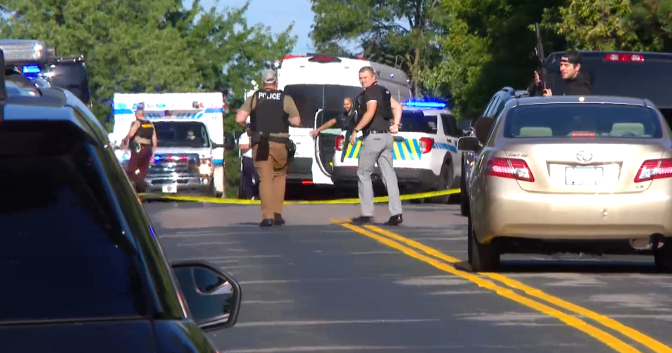The Complexities of Domestic Terrorism and Ideological Motives
#domestic_terrorism #ideological_motives #extremism #hate_crimes #mental_health

Introduction
The recent shooting at a Catholic church in Minneapolis has brought the topic of domestic terrorism and hate-filled ideology to the forefront. The FBI has labeled it as such, but experts say that the situation may be more complex than that. In light of this, the search for ideological motives behind the attack is underway.
Key Details
The FBI's statement has sparked a debate about the definition of domestic terrorism and how it relates to hate-fueled attacks. Some experts argue that the term is too broad and can lead to overgeneralization and stereotyping. They also point out that the attacker's personal struggles and mental health should be taken into consideration.
Furthermore, the attack has brought attention to the rise of extremist ideologies and hate crimes in the United States. According to the Anti-Defamation League, there has been a significant increase in white supremacist propaganda and hate crimes targeting religious and racial minorities in recent years.
Impact
The Minneapolis shooting has highlighted the need for a more nuanced approach when it comes to identifying and addressing extremist ideologies. The oversimplification of the situation can have detrimental effects, especially for marginalized communities. It also emphasizes the importance of addressing mental health and personal struggles in preventing these types of attacks.
In conclusion, while the search for ideological motives in this tragic event continues, it is important to remember that there is no
About the Organizations Mentioned
FBI
The Federal Bureau of Investigation (FBI) is a premier law enforcement agency in the United States, renowned for its role in protecting the nation from domestic and international threats. Founded on July 26, 1908, as the Bureau of Investigation, it was initially tasked with addressing land fraud and corporate malfeasance under President Theodore Roosevelt[1][2]. Over time, its mandate expanded significantly, particularly with the passage of the Mann Act in 1910, which allowed federal jurisdiction over certain moral offenses[1][4]. ### History and Evolution The FBI underwent significant transformation under J. Edgar Hoover, who became its director in 1924. Hoover implemented strict hiring standards and enhanced operational capabilities, transforming the agency into a robust investigative force[1][4]. The FBI's name was officially changed to the Federal Bureau of Investigation in 1935[5][6]. Throughout its history, the FBI has faced challenges, including concerns about potential abuses of power, but it has consistently demonstrated its value in national security and law enforcement[3][4]. ### Key Achievements The FBI has been instrumental in combating various crimes, including white-collar offenses, civil rights violations, and national security threats. Notable achievements include its role in enforcing the Espionage Act during World War I and its investigations into organized crime throughout the 20th century[2][4]. ### Current Status Today, the FBI is a sophisticated agency with over 37,100 employees, including special agents and professionals in various fields such as intelligence analysis and cybersecurity[5]. It operates in 55 field offices across the U.S. and has an international presence in 81 nations[5]. The FBI continues to evolve, addressing emerging threats like cybercrime and terrorism while maintaining its commitment to justice and integrity. ### Notable Aspects The FBI is known for its rigorous training programs at the FBI Academy in Quantico, Virginia, and its advanced forensic capabilities at the FBI Laboratory. Its work in business and technology includes
Anti-Defamation League
The **Anti-Defamation League (ADL)** is a prominent international non-governmental organization founded in 1913 in Chicago to combat antisemitism, bigotry, and discrimination broadly. It originated after the wrongful conviction and lynching of Leo Frank, a Jewish factory manager, which highlighted prevalent antisemitism and inspired Sigmund Livingston, a Chicago lawyer, to establish the ADL under the auspices of the B’nai B’rith organization[1][2][3]. The ADL’s mission is twofold: **to stop the defamation of the Jewish people and to secure justice and fair treatment for all** marginalized groups, reflecting its commitment beyond Jewish advocacy to broader civil rights[2][4]. Initially, the ADL focused on countering antisemitic stereotypes and defamation in media, theater, and print. A notable early achievement included efforts led by Adolph Ochs, publisher of The New York Times, who pressured newspapers to avoid antisemitic portrayals[1]. Over time, the ADL expanded its scope to monitor hate crimes, extremism, and antisemitism globally, assist law enforcement in prosecuting hate-motivated crimes, provide antibias and diversity training, and develop Holocaust education curricula[1][2]. The organization is headquartered in New York City, with about 30 regional offices across the United States and an office in Israel, underscoring its international reach and strong support for Israel[1][2]. Since becoming independent from B’nai B’rith in 2009, the ADL has increased its visibility and influence in advocacy, particularly in hate crimes legislation and policy reform, including expanding protections to racial, ethnic, and LGBTQ+ communities[2][5]. Notably, the ADL has been influential in shaping public discourse on hate speech and extremism, though it has also faced criticism for its political stances, particularly regarding its role in controversies involving racial and Middle Eastern issues[5][6]. Its archives and












